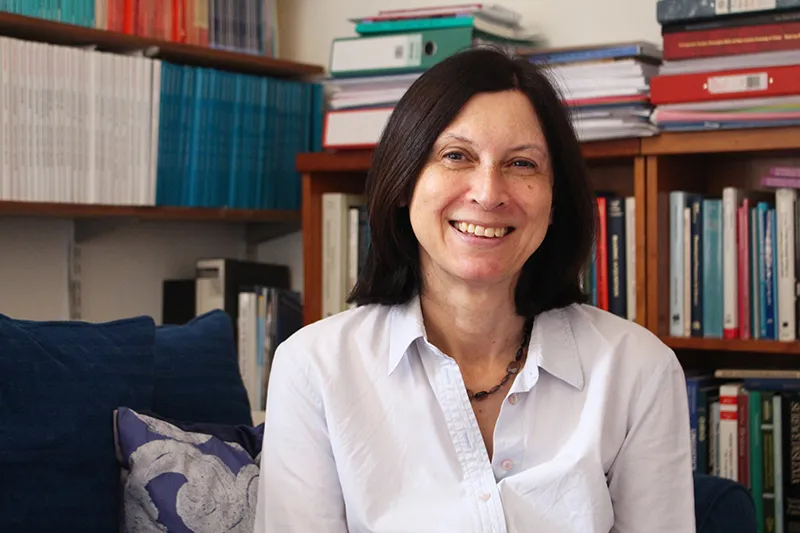Two Fellows of St John’s College have been awarded prestigious grants by the European Research Council (ERC) worth £2.5 million each to carry out innovative research.
Professor Sir Richard Friend, Director of Research at the Cavendish Laboratory, and Professor Usha Goswami, Director of the Centre for Neuroscience in Education and Professor of Cognitive Developmental Neuroscience, will each receive Advanced Grants of €2.5 million in the funding competition, part of the EU’s Horizon Europe programme.

Sir Richard’s new project is titled BRIGHTS, short for ‘Bright High Spin Molecular Semiconductors’, and builds on his breakthrough in creating materials that shine brightly even in higher electronic spin states.
These materials have the potential to transform fields like quantum science and optical technologies by combining luminescent properties with quantum spin behaviour.
“This new avenue of research comes out of our long-standing work on LEDs and an unexpected finding,” said Sir Richard. “Some of our molecules that have overall electron spin can be extraordinarily bright and luminescent. While most molecules do not achieve this level of luminescence, we now understand the underlying mechanisms that enable this phenomenon.
“This knowledge allows us to design molecular systems where we can carefully control the nature of the interactions between spins.”
At the heart of the BRIGHTS project is the development of new materials that can both emit light effectively and support high-energy spin states.
“The versatility of molecules is profoundly powerful”, said Sir Richard. “We can manipulate their structures to transform exceptional light emitters into quantum objects when their spins can be controlled and measured using photons. Unlike inorganic materials, every atom in our molecular systems is intentionally placed to achieve specific outcomes.
“This capability suddenly propels us into the realm of quantum science, with potential for applications in sensing, information storage, and optical technologies. This European funding provides the means to pursue these ambitions.”

Professor Goswami’s research will take a cross-language approach to the early identification of dyslexia and developmental language disorder (DLD) using speech production measures with children.
She said: “I am absolutely thrilled to be awarded this funding, which will support a collaboration between three laboratories and four languages – English, Basque, Spanish and French.
“By the end of the project, we will have data from more than 1,200 children, enabling us to apply the latest AI techniques to try and develop a cross-language diagnostic tool for dyslexia and for developmental language disorder.”
Professor Goswami and her team will be collaborating with the Basque Centre on Cognition, Brain and Language in San Sebastián and the University of Aix-Marseille, France.
The researchers will compare children’s ability to say correctly multisyllabic words such as ‘alligator’ from the age of two-and-a-half to six years, including additional groups aged around eight already diagnosed with speech and reading difficulties.
“In English, I have shown that children with dyslexia can be identified from inaccurate volume-related changes in speech production and children with DLD can be identified from inaccurate pitch-related changes. My earlier research showed these children cannot hear these speech features very well,” said Professor Goswami.
“Using novel methods of speech analysis, we have now shown these children also cannot produce these features of speech very well, even following repeated tries, offering novel opportunities for early diagnosis and intervention.
“In the project, we are purposely comparing languages with different rhythm types and different degrees of spelling consistency.”
The St John’s academics are among 11 senior researchers at the University of Cambridge to receive the Advanced Grants – the highest number of grants awarded to any institution in this latest funding round.
The funding, worth €721 million in total, is going to 281 leading researchers across Europe. The Advanced Grant competition is one of the most prestigious and competitive funding schemes in the EU and associated countries, including the UK.
It gives senior researchers the opportunity to pursue ambitious, curiosity-driven projects that could lead to major scientific breakthroughs.
Professor Sir John Aston, Cambridge’s Pro-Vice-Chancellor for Research, said: “Many congratulations to our Cambridge colleagues on these prestigious ERC funding awards.
“This type of long-term funding is invaluable, allowing senior researchers the time and space to develop potential solutions for some of the biggest challenges we face.”